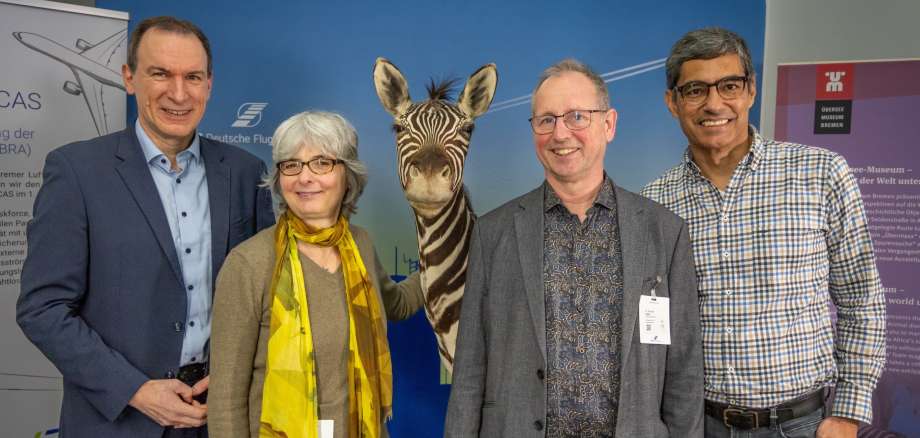The DFS air traffic control centre in Bremen welcomed a special guest on Wednesday. Dr Michael Stiller, Head of the Department Natural History at Bremen's Übersee-Museum, has presented a zebra from the museum's exhibition to the air traffic controllers to stay with them for the next three months. "The zebra plays an important role in the future of air traffic control. It is a symbol of the largest airspace reorganisation in recent decades," explained Andre Biestmann, Director Operations at the DFS control centre in Bremen. But what does a zebra from the African steppe have to do with the airspace of northern Germany? "The German acronym ZEBRA stands for the sustainable renewal of Bremen's ATS sectors," explained Andre Biestmann.
The official handover of the zebra marks the start of air traffic controller training at the beginning of the new year. The new airspace structure will be implemented in March 2025. The changes will not affect the immediate vicinity of airports but the western part of Bremen's airspace over the North Sea, Schleswig-Holstein, Bremen, Hamburg and Hannover. Among other things, these changes focus on the dimensions of the individual airspace sectors, each of which is handled by two air traffic controllers. "The aim is to reduce complexity and create even more capacity for our military and civil customers in the future. But above all, the ZEBRA project is paving the way for the introduction of the new trajectory-based air traffic control system iCAS in the first quarter of 2028," explained Hansjörg Trost, Head of Operations, Airspace & Procedures.
Developed in close cooperation with the iCAS working group, all operational expert groups as well as military and civil partners, the project ensures maximum compatibility with the future-oriented, trajectory-based air traffic control system iCAS. It also optimises internal and external interfaces and traffic flows, and seamlessly integrates new training airspaces for the armed forces.
The air traffic control system iCAS represents a new generation of air traffic control. With 4D trajectories, the system very precisely calculates the further flight path in three-dimensional space for each aircraft, supplemented by the fourth factor, time, to ensure the efficient flow of traffic. Potential conflicts between aircraft are displayed to air traffic controllers at an early stage, allowing their efficient resolution. The capabilities of the flight trajectories can be optimised in the new ZEBRA airspace.
"The idea of making the acronym tangible with a real zebra came from one of my team members. Now the zebra from the Übersee-Museum welcomes our air traffic controllers every day during the training period and brings us luck for the implementation of this ambitious project," said Hansjörg Trost.
Dr Michael Stiller from the Übersee-Museum is happy that the temporary guest from his museum can contribute to the success of the project: "We are delighted that our zebra from the Übersee-Museum is helping to establish the project visually and emotionally in the minds of everyone involved. A surprising and unusual request, which we were happy to fulfil."
Andre Biestmann, Director Operations at the DFS control centre in Bremen, helped to push ZEBRA forward before handing over the prepared field to his successor Steffen Liebig at the turn of the year. Andre Biestmann will be relocating to DFS Headquarters in Langen, where he will be in charge of Corporate Safety & Security Management. Steffen Liebig was previously Director Operations in Karlsruhe.
Media contact:
Anja Naumann
Telephone +49 (0)421) 5372-116
E-mail: presse@dfs.de
Downloads
DFS Deutsche Flugsicherung GmbH (DFS), the German air navigation service provider, is a State-owned company under private law with 5,600 employees as at 30 June 2023. DFS ensures the safe and punctual flow of air traffic over Germany. Around 2,200 air traffic controllers guide more than three million flights through German airspace in peak years, up to 10,000 every day. The company operates control centres in Bremen, Karlsruhe, Langen and Munich as well as control towers at the 15 designated international airports in Germany. The subsidiary, DFS Aviation Services GmbH, markets and sells products and services related to air navigation services, and provides air traffic control at nine regional airports in Germany and at Edinburgh Airport in the United Kingdom. DFS is working on the integration of drones into air traffic and has set up a joint venture, Droniq GmbH, with Deutsche Telekom. Other subsidiaries include R. Eisenschmidt GmbH, which markets publications and products for general aviation, and Kaufbeuren ATM Training GmbH (KAT), which provides training for military air traffic services personnel. The joint venture FCS Flight Calibration Services GmbH offers flight inspection services.
